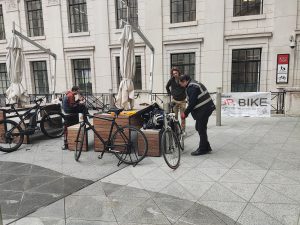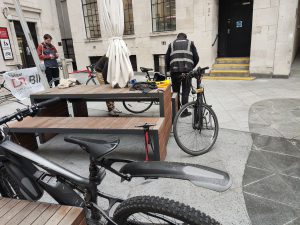This guest blog comes courtesy of Marco Hacon, the Energy Team’s Sustainability Champion Assistant.
I recently worked with the team behind King’s sustainability module on the section on energy.
Side note: If you haven’t heard of it, where have you been? For those of you that haven’t seen it, it’s a great open-access resource that brings interdisciplinary knowledge from both students and staff. Don’t be put off if you don’t have any understanding of sustainability, the module aims to provide something for everyone. So, even if you have a strong knowledge base, it covers a lot of areas; you’re guaranteed to learn something new. Check it out here.
Anyway, as part of my research for it, I learned that in the UK (as of December 2020), renewable production generated 40.2% of total electricity produced in the UK; around 6% of total UK energy usage. This last number surprised me. The 2020s are supposed to be the decade of green action with the UK having a strategy in place for decarbonising all sectors of the economy to meet a net-zero target by 2050. So it made me wonder: why is there a lack of renewable energy use in the UK? Well, here’s what I found out:
First, the UK has a regressive approach to funding low-carbon transitions. The energy is currently being funded by levies on the energy bills of consumers. As it stands, 27.9% of energy bills go towards the construction and maintenance of energy infrastructure. Consequently, those who spend more on energy bills relative to their income contribute more to the low-carbon transition. Let me be clear, as I’ve expressed in another blog post, this has not caused the current energy price crisis. But, as prices rise with the increased cost of living, if these bills cannot be met, the transition will be held up. There’s nothing just about that.
As a result, the UK sector doesn’t receive enough support to produce and manage energy. According to data from the Office of National Statistics released on the week of the 14th of February, the UK’s low-carbon and renewable energy economy has failed to grow since 2014. In the same period, employment in areas such as manufacturing low-carbon technology, energy supply and construction has actually dropped by 28,000 and is currently roughly 207,800. Particularly concerning is that areas such as onshore wind and solar energy, which are essential components of a low-carbon energy mix, have been hit the hardest. It would be easy to place blame at the door of Coronavirus, but it looks like businesses in these areas were struggling in 2019. Even in relation to offshore wind, the UK’s flagship renewable source, energy production isn’t as high as might be hoped. Despite historically high energy output from wind farms in Scotland, the UK generates less than its counterparts in Europe.
Another reason that the UK is struggling to increase renewable energy’s contribution is storage. With much renewable energy being reliant on weather conditions, inter-seasonal storage remains a core challenge for the industry (and not just the UK). As such, there needs to be a lot of investment in energy storage. Lithium-ion batteries are expected to dominate the storage boom. On this front, the UK has started to invest. It has been recently announced that one of Europe’s largest battery storage facilities is set to be built in Scotland and is due to be operational in 2024. The Green Battery Complex will comprise two 400 MW facilities, each providing 800 MWhrs of energy storage capacity. However, capacity is measured in hours instead of days or weeks. As a result, looking forward, the UK would be wise to invest in other energy technologies such as green hydrogen, ‘gravity’ storage, and ‘cryogenic’ batteries.
In terms of other things the UK must consider when looking to the future, it must place localism at its heart, promoting community energy developments and supporting households. This is both in terms of reducing energy waste such as insulation as well as initiatives like solar panels that reduce the need for grid-supplied energy.
Correction from previous blog post.
In a blog post from 2021, titled “King’s Energy: The Noor Ouarzazate Solar Complex”, the author outlined that it would take 116.5 Noor’s to supply the world with renewable energy based on 2019 demand. The actual number is 116.
Thank you to Assoc. Prof. Johan Montelius from Royal Institute of Technology (KTH) for identifying this and bringing it to our attention.
 Marco Hacon is currently studying for a Master’s degree in Environment, Politics and Development here at King’s. Before this, he worked in a few start-ups and scale-up companies with social purposes, where he gained a basic understanding of sustainability. He is a strong believer in a just and equitable clean energy transition. He is excited to write about this as well as more King’s-related energy topics for the team’s blog. He also wants to help develop toolbox talks for King’s staff and teams that centre on how to use energy sustainably.
Marco Hacon is currently studying for a Master’s degree in Environment, Politics and Development here at King’s. Before this, he worked in a few start-ups and scale-up companies with social purposes, where he gained a basic understanding of sustainability. He is a strong believer in a just and equitable clean energy transition. He is excited to write about this as well as more King’s-related energy topics for the team’s blog. He also wants to help develop toolbox talks for King’s staff and teams that centre on how to use energy sustainably.
 On 3rd March, a cycling event was held at Bush House as part of Sustainability Month to increase awareness and understanding of how students and staff can get started with cycling in London.
On 3rd March, a cycling event was held at Bush House as part of Sustainability Month to increase awareness and understanding of how students and staff can get started with cycling in London.

 Marco Hacon is currently studying for a Master’s degree in Environment, Politics and Development here at King’s. Before this, he worked in a few start-ups and scale-up companies with social purposes, where he gained a basic understanding of sustainability. He is a strong believer in a just and equitable clean energy transition. He is excited to write about this as well as more King’s-related energy topics for the team’s blog. He also wants to help develop toolbox talks for King’s staff and teams that centre on how to use energy sustainably.
Marco Hacon is currently studying for a Master’s degree in Environment, Politics and Development here at King’s. Before this, he worked in a few start-ups and scale-up companies with social purposes, where he gained a basic understanding of sustainability. He is a strong believer in a just and equitable clean energy transition. He is excited to write about this as well as more King’s-related energy topics for the team’s blog. He also wants to help develop toolbox talks for King’s staff and teams that centre on how to use energy sustainably.


